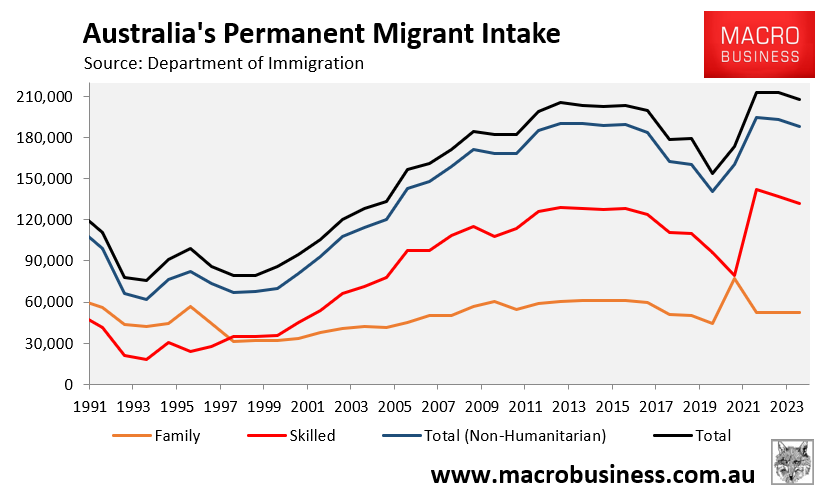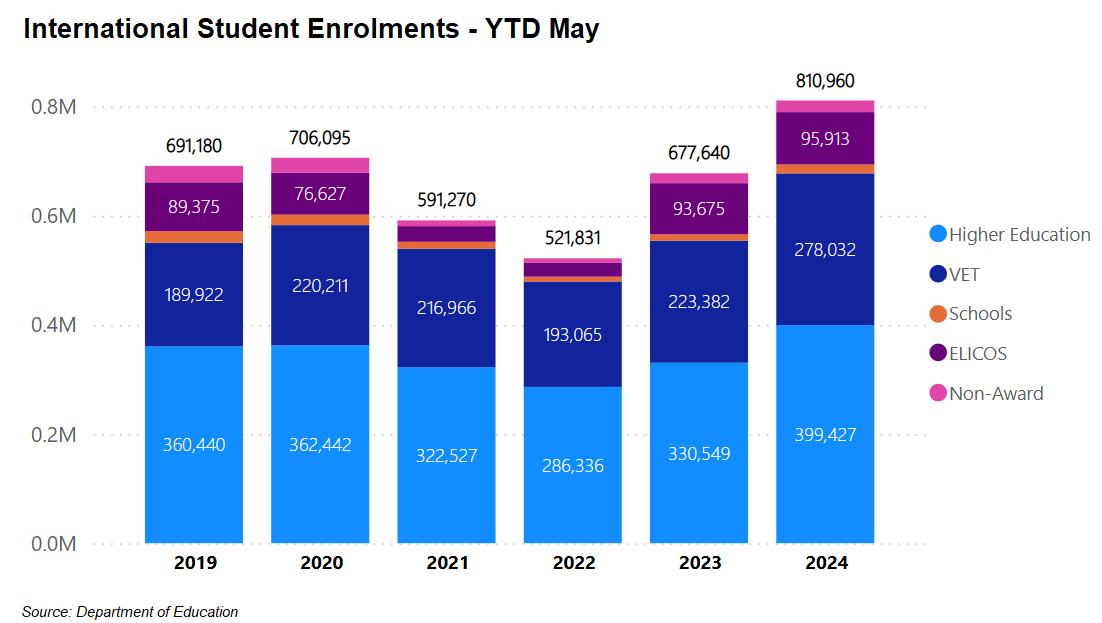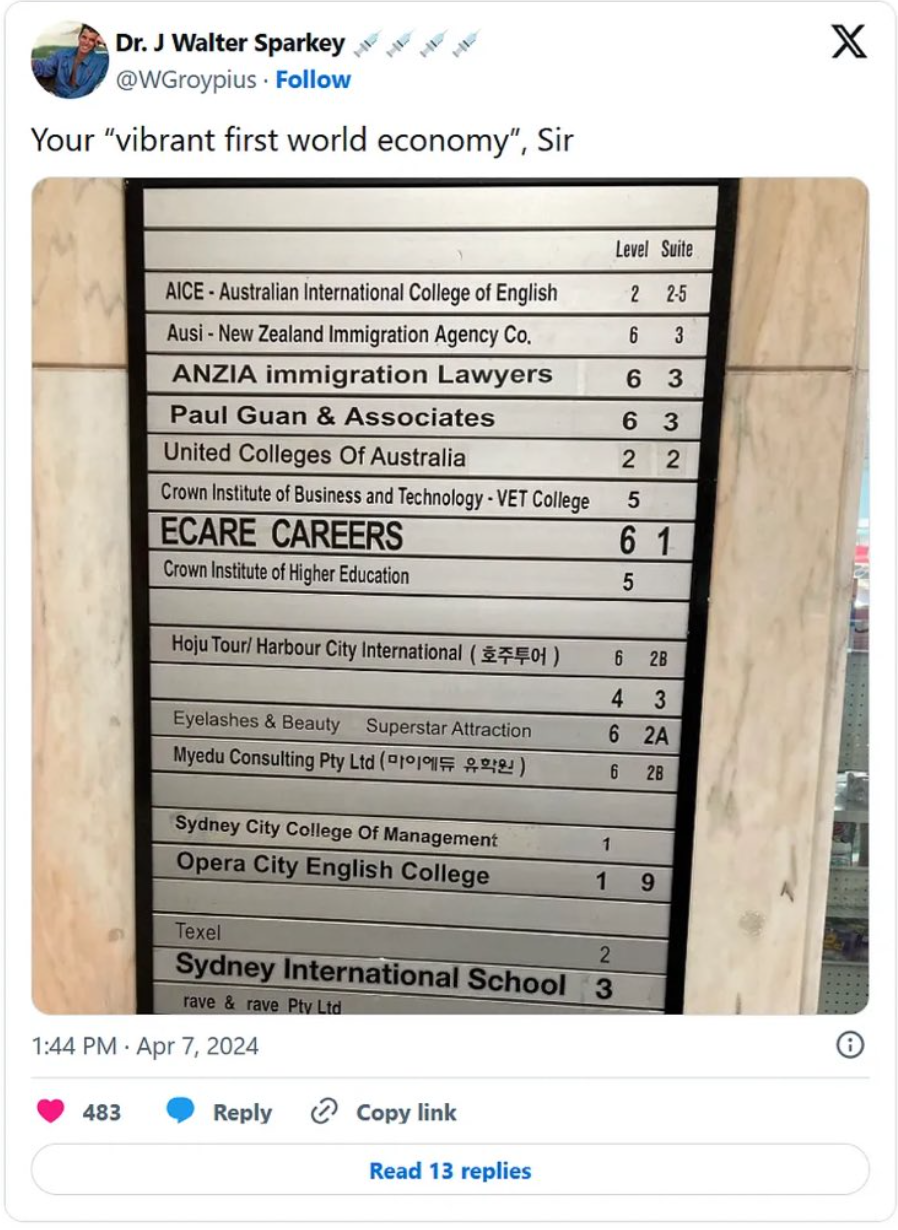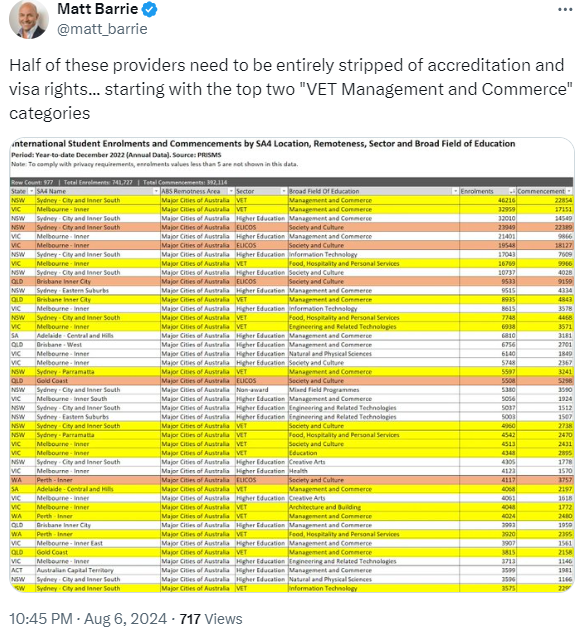In 2022, Claire Field, a former vocational training sector regulator, warned that a large number of South Asian students were arriving in Australia in “response to the unlimited work rights now available to those on Australian student visas”, enrolling in “lower quality and cheaper vocational colleges” to enter Australia to live and work.
The deluge of arrivals coincided with the former Morrison Government’s decision to remove the cap on the number of hours that international students could work while studying and award a two-year Temporary Graduate visa to Vocational Education and Training (VET) graduates.
The Albanese Government then opened the floodgates further by declaring at the 2022 Jobs & Skills Summit that it would uncap work hours for another year and extend post-study work privileges by two years for recent graduates with certain degrees:

Source: Jobs & Skills Summit
Labor also boosted the permanent (non-humanitarian) migrant intake to a record high of 195,000 per year (now 185,000), which boosted the probability of students converting to permanent residency:

Shortly after the Albanese Government’s reforms, Labor backbencher Julian Hill warned that Australia’s international education system had devolved into a “Ponzi scheme” for luring non-genuine students to the country with unrestricted work rights and permanent residency, which was being ruthlessly exploited by unethical education agents.
“Uncapped work rights is being misused by agents in many parts of the world who are flogging our precious student visa as some kind of cheap, low rent work visa. No one should permit that to continue”, Hill said.
“We know that the incentive of a permanent visa to Australia is like a golden ticket from Willy Wonka’s chocolate bar”.
“It’s too powerful an incentive that would drive and pervert behaviour by providers, and some students”, Hill warned.
Hill’s concerns were warranted, with international student enrolments exploding, led by students from South Asia:

As shown above, VET enrolments experienced the largest proportionate increase for reasons outlined by Claire Field above.
Recognising that it had jumped the shark, the Albanese Government has tightened requirements and rules surrounding student visas, including:
- Reducing the number of hours that international students can work during semester to 24 hours a week. However, this is 4 hours more than was permitted before the pandemic and among the highest permissible hours in the world. Students can also work unlimited hours between semesters.
- Increasing the fee for international student visas from $710 to $1,600.
- Ending the ‘visa hopping’ loopholes that allowed international students and other temporary visa holders to continuously extend their stay in Australia, in some cases indefinitely.
- Banning Visitor Visa holders from applying for Student Visas onshore.
- Requiring prospective international students to have higher levels of English and more savings to support their stay in Australia.
- Implementing caps to bring student numbers back to 2019 levels.
Worryingly, Claire Field has identified at least 11 vocational colleges that have been deregistered or sanctioned by the Australian Skills Quality Agency that have been allotted international student places for 2025 under Labor’s student caps.
Although deregistration will stop those colleges actually enrolling new students, Field says the fact that the banned colleges have been allocated student places suggests that the process for awarding places seems to be totally automated and lacking rigorous oversight.
Field says that rewarding dodgy colleges based on prior years enrolments will leave quality colleges as “collateral damage”.
“ASQA [Australian Skills Quality Authority] imposes sanctions for serious breaches of the regulatory standards, such as not having properly qualified teachers, not requiring students to attend classes, not having genuine assessment practices, graduating people as qualified when they’re not”, Field said.
“It begs the question why providers who are subject to serious sanctions should be given higher enrolment caps than other legitimate providers – simply because of a formula or algorithm”.
“Legitimate institutions that have been delivering quality training for years will not be allowed to enrol sufficient students for some of them to continue operating”, Field said.
Holmes Institute chief executive Stephen Nagle agreed, noting that it actually reduced international enrolments in 2023 “because we were being careful to only enrol legitimate students”.
By contrast, “other providers threw open their doors and gave no consideration to the type of student they enrolled. Now we are being penalised and they are being rewarded”, Nagle told The AFR.
Claire Field also said that claims by Skills Minister Andrew Giles that 150 “ghost colleges” had been shut down by ASQA were over-cooked.
These are fair gripes about Labor’s caps, which have been bluntly applied without proper consideration or analysis of individual institutions.

There are around 3,800 registered training organisations in Australia. There are plenty of shonky providers that pass the low bar to be accredited.

The rorting of the student visa system has taken place for so long that it has become normalised. It is a feature, not a bug.
However, it is the student visa factories that must be driven out of business, not the legitimate providers.
The Mickey Mouse providers must lose their accreditation and have their visa applications rejected. This would allow more allotments for the genuine providers.
More generally, Australia must aim for a far smaller cohort of high-quality students. The focus of the student visa system must be on quality over quantity. This can be achieved by:
- Raising entry standards (e.g., further lifting English-language proficiency and entry testing);
- Further raising financial requirements needed to enter Australia; and
- Removing the explicit link between studying, working, and permanent residency.
The entire “industry” must transform back to providing high quality education, not backdoor immigration into Australia.

